Discovering Who Jesus Is At the Table: Mark Lowry and Andrew Greer
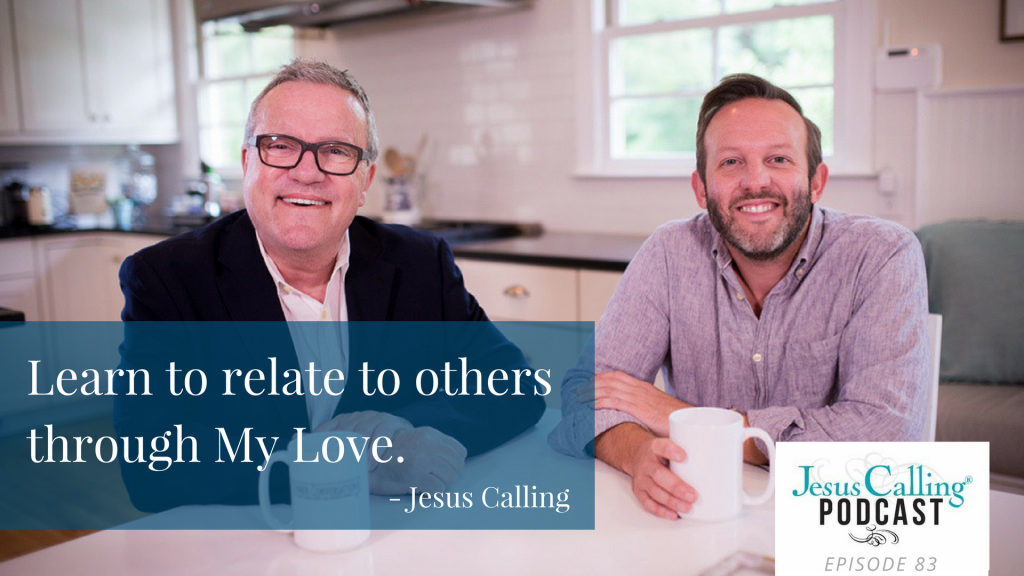
Songwriters and authors Mark Lowry and Andrew Greer are the hosts of the film series and podcast “Dinner Conversations: Turning the Light On, One Question At A Time.” They each share their backgrounds and their shared love for music and storytelling. They also discuss why they think conversations are an important facet of building our faith and deepening our knowledge of Christ and others.
Discovering Who Jesus Is At the Table: Mark Lowry and Andrew Greer – Jesus Calling Podcast Episode #83
Narrator: Welcome to The Jesus Calling Podcast. Our guests today are award-winning singers, songwriters, and authors Mark Lowry and Andrew Greer. Mark and Andrew are the hosts of a video series that appears on iTunes, YouTube and Facebook called “Dinner Conversations: Turning the Light on One Question at a Time.” The two friends began the show as a way for people they admire and respect to have candid conversations about life, faith, and the things that matter to them most. Mark and Andrew both also share their backgrounds and a love of storytelling — and why honest and open conversation has always meant so much to them both.
The Legacy of Storytelling
Andrew: Hey, I’m Andrew Greer, and I’m a singer, a songwriter, an author, and a conversation starter here in Nashville, Tennessee.
Mark: My name is Mark Lowry, and I’m the old one of this duo. I’ve been around doing a lot of stuff for a long time. I write songs. I’ve written books. I’ve written children’s books. I’ve sung in a quartet. I’ve sung solo. I’ve been accused of being a comedian. I’m a storyteller. That’s probably it in a nutshell because everything is just about the story, the one story.
Mark: I remember my dad and his brothers, the Lowry boys. They would sit around and tell stories when they were young. My dad said I was like five or six, and I walked up and wanted to tell a story about something I’d done. My dad stopped me. He said, “Whoa, whoa, Mark.” This had probably just happened yesterday. “You’ve got to let a lot of years to pass before you go back and tell these stories.”
My mother played piano in church. I wasn’t athletic. I went out for peewee everything. They made me the waterboy because I’d get out in left field. My dad told me this the other day. He said he looked out there, and I was just sitting down. He came up and said, “Why are you sitting down?” I said, “None of my friends can hit it this far out.” That was my thing. Why would I stand when I could sit? I wasn’t good at sports, but I started singing when I was three or four. I sang in church the first time when I was four, and I would come home with pockets full of nickels because of the little old ladies in the church. I’d go around collecting my offering, and they’d fill my pockets with nickels. Momma said she would just shake the nickels out of my pants. So singing came, and then I heard the singing Rambos which changed my life. I mean, I don’t know if you had a group or a song…? For me, it was a group. It was the Rambos. All I knew was our independent Baptist church and John W Peterson with beautiful and slightly predictable music. Then, I go to Jones Hall in Houston, Texas. I’m on the front row. I’m 11 years old. Dottie and Reba walk out on that stage, and my life was changed forever because of the harmonies. And they would pull against the rhythm. The music stayed. It never wavered, but they would pull together with it. It was like they were riding a musical bronco. I get chills thinking about it now. My life was changed.
Andrew: I grew up in Texas as well. I consider it kind of the threshold of the western part of Texas. West of Fort Worth, going towards Abilene. Loved it. It was a very rural experience with lots of what I call real people. It was a close community. My parents had both grown up in more metropolitan areas… my mom in New Orleans. So I had huge influences of music, and culture, and art, and there was a lot of music in my household growing up… a ton. My mother’s a professional organist and has also been involved in music of the church and school systems for years. So that was a big part of… I remember music being the, you know, the facilitator and the environment of our home growing up was music. Even from a spiritual experience, music was the beginning of my conversations with God.
“Even from a spiritual experience, music was the beginning of my conversations with God.”
I always tell my mom and dad: “If you hadn’t introduced me to music, I don’t know that I would have…” I’m sure I would have been introduced to God in some way, but I don’t if the conversation and dialogue would have been as gracious and as generous or if I would’ve understood God to be what I believe He is to be, which is unconditionally loving. Music just has had a way of softening my heart and my life in ways when, I think, it was threatening to get harder.
Inspiration Through Story & Song
Mark: When I was 14, I put my stake in the ground and said, “I’m going to believe this.” I really think I’ve known God since the day I heard His name. I’ve loved Jesus since the day I heard about Him, but on June 5th, 1973, at a church camp in Texas called Beulah Land is when I knelt down and said, “This is going to be what I believe, and I trust Jesus as my Savior.” And I started believing what I was singing. That makes a difference.
“This is going to be what I believe, and I trust Jesus as my Savior.”
Andrew: Yeah, and that’s part of what you heard from the singing Rambos. It was their belief. It was their spirituality infused. When someone’s personal beliefs are actually coming through their communication and in music, I just think it’s profound. I had a similar experience, except with CeCe Winans.
CeCe… I remember. I was probably 10, 11, 12. I was on the front row of a show, and she came out, and it was the same thing. The way that she could draw out from you so much feeling and emotion as a spectator while she was singing… she could draw so much out of a line, and when I heard her I was like, “How can I not believe what she’s singing about because it is so authentic?” Her experience right there was so authentic it was making this whole thing real. It made God tangible — the way that she sang it with so much passion.
They weren’t afraid of performing. In our worlds of the mixture of performance and spirituality, there’s always been like this tension of… but some people just own it by saying, “I am a performer.” To do that excellently is as much of a spiritual expression as it is to lead worship on Sunday morning in church or whatever.
My parents and I would drive to Dallas when I was a teenager, and they were mostly general admission shows. My parents were already kind of getting silver hair and are super pale and white, and we would be in there with 2,500 African American folks and maybe 20 Caucasian people. And then there are my parents with silver hair. They would just wrap…I mean, they loved us so much. And I’d want to get there early to get in the front row, and they would stand the whole concert.
Mark: I know. I hate that part. I love God, but I can sit down and love Him.
The Lord called me into the music ministry. He spoke to me, and for a Baptist to say that, I’m telling you… I mean it. It wasn’t audible. It was much louder than that. It was in my spirit, and He called me. I surrendered and said I would. He got the word out because I told Him this was His idea. And I’ve been booked ever since. From 1980 to 1988, I did about 200 concerts a year, right out of college, singing in independent Baptist churches, honing my craft, and making Baptists laugh. How that happened was because I had to do something while the little old man in the back of the church would change the soundtracks because you’d lay your cassette tapes out of the four songs you were going to sing that Sunday morning, and you had to put them in order.
Those few seconds of taking that cassette out and putting the next one in and hitting “Play,” can make it feel like they’re doing it in slow motion. And Baptists, back then, they wouldn’t clap because that’s giving glory to men.
Andrew: So it would just be silent?
Mark: Oh, yes. They might say, “Amen.” They wouldn’t shout, but they would laugh. That’s how I knew they were listening. So I would tell these stories. I just started telling stories that would set up the song. The songs eventually became exclamation points to the stories because eventually I noticed they were listening. So I went with that.
I started working on that and trying to improve that. So I did that for eight years. Gaither found me through Roy Morgan who handed Bill a tape. It was just the timing. Gary McSpadden was leaving. Bill was looking. That started that journey, and at the same time I was doing that, I was also having a solo career at Word Records doing all those parody things I did. I had two things going at once: the Gaither Vocal Band and the solo career. It was two different labels and two different worlds, really.
The Pursuit of Purpose
Andrew: I moved from Texas to Nashville to go to Belmont University as a music student, but I didn’t know what I wanted to do in music. I had no desire to be an artist. I was not writing songs at that time. I ended up at Rocketown Records through Michael W. Smith because one of my friends thought I might be better on the business side, or just have some interest in the business side. That’s where the background in journalism came along. I don’t have any formal background in writing or anything like that, but April Hefner, who had been CCM Magazine’s editor years before that was at Rocketown and started to connect some of those dots.
Then I started to write songs for some other Christian artists, but really, for me, where I feel like my place of authenticity — as far as what I have to offer and contribute and how I do that — came through a series of three things. Career stuff was changing and transitioning with Rocketown, and I was trying to understand what I wanted to do and where i wanted to go. That was the most surface thing that happened. Then there was the end of a long relationship that was very painful, and there was some betrayal in that and deception. That just hit me in a place I didn’t anticipate and a lot deeper than I anticipated. That was a beginning of realizing that I had feelings. I think I was kind of coasting on the surface until I was 22 or 23. That plunged me under a little bit, so that when I resurrected, I had new things and new ideas and new feelings, especially about God.
The third thing was I was starting to deal in my own personal counseling with some addictions I had dealt with since I was an adolescent, in the beginning of adolescence. I started hitting those head on, which at first is really great. It’s exhilarating when you start talking about things that you’ve never talked about before, and you bring them into the light, which is a spiritual thing. You allow God to begin the healing process through you. At the same time, my counselor would always say you kind of have this arc up because it’s exciting and it’s adventuresome to allow healing to take place, but in addictive cycles, you will crash and go even deeper than before. And so I think I was experiencing some of that.
“You allow God to begin the healing process through you.”
A Time for Spiritual Rest
Mark: One thing I’ve learned is when the plane is out of gas, the plane is coming down. You can crash it, or you can land it, but it’s coming down. My plane was out of gas. I couldn’t hear the songs anymore, and I loved those songs. I didn’t feel the presence of the Lord. I was smiling on stage, and yet I wasn’t really feeling it. But I knew if I didn’t smile people would write letters, and so I went away for two years and lived on a houseboat.
I went away, and I refreshed my spirit. I rested, and I read, and I prayed. I just lived… lived a life. I read the Life of the Beloved, by Henri Nouwen, and I read The Grace Awakening by Chuck Swindoll and other books Gloria Gaither would give me.
Andrew: I felt like spiritually my back was up against the wall. I needed a reprieve. Maybe, similar or different reasons, but the feeling of what you were feeling when you needed to go take rest. My plane was going down, and it was going down really early in my life. That was a bit shocking to me. I had a real stable growing up experience and a real sweet relationship with God. I was fairly mature, I thought, at the time. I love nature. I love backpacking and hiking. I feel like I have the space. My head and brain are on fire a lot, so I feel like I can relax that and extinguish that and let it just relax… let my heart relax and my spirit relax in the context of nature.
So I went to Wyoming for almost a year and kept everything in Nashville as it was — my house and everything. I went and backpacked and met new people. I met people who were in the throes of despair and people who were in really revelatory places in their life spiritually speaking. And there was a piano — Buffalo Bill Cody built this old lodge around 1900 just outside the east entrance of Yellowstone. I met the owners of that lodge. It was not a working lodge. It was kind of centered in this more modern lodge that had been built on the outskirts of that property. They knew music was a part of my background, and they said, “There’s an old piano in there from the 1930’s. You’d be welcome to play it anytime.” This is an uninsulated lodge in the middle of the Shoshone National Forest. I thought, “There’s no way that piano is going to be playable or anything.”
But I go in there, and remember, music is where I first even began talking and dialoguing with God. When you feel, spiritually, like your back is up against the wall, I didn’t really know how to dialogue. I was trying to figure out how to talk to Him again. And honestly, someone said, “What’s your goal for leaving?” I said, “I don’t know if God is interested or even available or accessible or real, but I would like to discover who He might be if He is.” I didn’t even realize it then, but I was also beginning to learn how to articulate my story and beginning to see how other stories intersect with our own and how God’s story is really motivating all those stories.
“When you feel, spiritually, like your back is up against the wall, I didn’t really know how to dialogue. I was trying to figure out how to talk to Him again.”
Mark: God is just so interesting. I’m not spiritual. I don’t get on my knees and pray very much. I don’t know when was the last time I got on my knees and prayed, but I talk to Him all the time. I think I do understand “pray without ceasing” because I’m always in continual prayer. I think that’s why Jesus Calling is such a good thing because the overarching thing I see when I read Jesus Calling in my phone is that it seems like the Lord wants us to keep our mind on Him. That’s the overarching thing: keep your mind. All through your day, your focus really should be Me. Not “What Would Jesus Do.” That’s a trivial way of saying it. But just being conscious of Him, praying to Him, talking to Him.
I love knowing and having a good foundation of scriptures, so when I read Jesus Calling and then they put those scriptures at the bottom to confirm. Because if it doesn’t sound like Jesus, I don’t want any part of it. To me, Jesus Calling sounds like Jesus. It’s the same voice that I hear when He talks to me. It’s always a loving thing.
“…the Lord wants us to keep our mind on Him…being conscious of Him, praying to Him, talking to Him.”
Andrew: Yeah, and it communicates in a way that is accessible.
Narrator: Mark and Andrew have a heart for knowing God and others. They talk about how they love telling stories and hearing others tell theirs and how they began to see this as a way to bring people around the table—a dinner table specifically—to go deeper with conversations on faith, family, friendship, and more. They feel that communion around the table is a sacred thing where God shows up, and they reflect on how we can all get something from being together and sharing our stories.
God Is Up To Something Eternal
Mark: A year ago, about this time, I was thinking of retiring… again. I do this every now and then, mainly because I found out that I could. Once I found out that I could, I was like, “Why not?” I thought, “What am I going to do with myself? Sit in this lazy boy and rot?”
I was sitting and watching that boy Jordan Smith sing “Mary, Did You Know” on The Voice. I don’t know if you saw it. Well, I’m in my La-Z-Boy, and my words are going across that screen because I have the subtitles on because I’m old and can’t hear very well. I’m watching my words — words that I wrote in a one bedroom apartment across town in 1984. I was just a child. Questions that I still have for Mary, plus most of the questions that I have for her didn’t make the song because they didn’t rhyme. I’m watching this, and it just dawned on me that my Father handed me a gift. He answered a prayer I wouldn’t ever be selfish enough to pray: that I could sit on my La-Z-Boy and reach the world.
How selfish is that? He drug a cross up a hill, and I want to be in my La-Z-Boy. But you know what I realized that day? I texted Jordan Smith, and this is what I said. I said, “Jordan, thank you so much for allowing me to sit in my La-Z-Boy and through you, tell the world what I think about Jesus.” What a gift that was from God. Fourteen million people heard my questions that point to Jesus, I believe. I believe the whole song points to Jesus. I hope everything I do points to Him.
I think that God is up to something. It is eternal, and it’s for everybody’s good. And I just believe He’s bigger than everything we could have dreamed.
Andrew: I trust Him!
Jesus’ Invitation To His Table
Mark: I trust that He’s good, He’s kind, He’s gracious, and that His blood is more powerful than we could have ever dreamed or imagined. And grace is like looking at the ocean, we only see the top of it. It is so big and so wide and so all-encompassing.
Andrew: Impossible to express. And I think that’s part of conversation. It’s our opportunity to chip away, little by little, at the mystery of God. Not that we’ll ever fully get to the bottom of who God is, and how beautiful is that idea — that we will never exhaust God? By talking with one another and by doing that in a generous loving way, where we’re saying, “Hey, what you’ve got to express is important. What I’ve got to express…and everyone deserves to be heard and listened to.”
I think that right there is opening our hearts and our spirits to allow the Spirit of God to then say and speak truth. It’s not my truth. It’s His truth, hopefully, abiding in and through us. I do think conversation — and that’s the point of Dinner Conversations — it’s saying, “If we just sit down in this generous place…” Which food is a thing that prompts us to be generous with one another. It’s a hospitable thing, and it’s something that we all need and that most of us enjoy. So we sit down at a place of need, and enjoyment, and relaxation, and calm, and are able to express ourselves with one another. I just think that’s the floodgates for God to express Himself to us.
Mark: The Kingdom of God is like the backing of a trailer… whichever way you think it goes, do the opposite, and you’re probably right. It’s upside down. It’s backwards. To live, you’ve got to die. To get, you’ve got to give. It’s a different kind of thinking.
Andrew: I think that people will discover something new about themselves, something new about the people around them, and something new about God by being inspired to have generous conversations with one another.
Mark: And I want to learn. I hope I learn a lot from this. I’m more selfish that way. I hope everybody gets something out of it, but I come for the conversation. I’m here for the conversation. I want to enjoy this conversation. I hope it gets deep and fun. Like all the wonderful conversations I’ve had through the years.
Andrew: I believe, and I think we believe –the reason why conversation is so important is because it allows for this kind of equal opportunity communion to happen. We believe that Jesus has set the table, and we just all get invited to sit around it and discover who He is. And if we’re learning something, we can probably bet someone else is learning something too.
“We believe that Jesus has set the table, and we just all get invited to sit around it and discover who He is.”
Narrator: To find out more about the Dinner Conversations video series and podcast, please visit Dinner-Conversations.com for more information.
Narrator: Next time on the Jesus Calling podcast, we hear from CMA award winning country artist Deana Carter. The daughter of famed studio guitarist and producer Fred Carter, Jr., Deana grew up around country music legends. She broke into the spotlight herself in the mid 90’s with a multi-platinum debut country record. Deana talks about her early years and how a hurt she experienced in church kept her from going there for 20 years, but that God was always working in her life, leading her back.
Deana: I think the biggest change has been humility in confessing my faults and seeing where I need to improve, not pointing the finger at everybody else, and having a little more empathy. Those kind of things, when God works on your spirit, the change starts happening with you.
Narrator: Today’s featured passage comes from the May 12th entry of the Jesus Calling Audiobook:
Audiobook Excerpt: Learn to relate to others through My Love rather than yours. Your human love is ever so limited, full of flaws and manipulation. My loving Presence, which always enfolds you, is available to bless others as well as you. Instead of trying harder to help people through your own paltry supplies, become aware of My unlimited supply, which is accessible to you continually. Let My love envelop your outreach to other people.
Many of My precious children have fallen prey to burnout. A better description of their condition might be “drainout.” Countless interactions with needy people have drained them, without their conscious awareness. You are among these weary ones, who are like wounded soldiers needing R&R. Take time to rest in the love-light of My presence. I will gradually restore to you the energy that you have lost over the years. Come to Me, all you who are weary and burdened, and you will find rest for your souls.
Call to Action: Hear more great stories about the impact Jesus Calling is having all over the world. Be sure to subscribe to the Jesus Calling Podcast on iTunes. We value your reviews and comments so we can reach even more people with the message of Jesus Calling. And if you have your own story to share, we’d love to hear from you. Visit JesusCalling.com to share your story today.
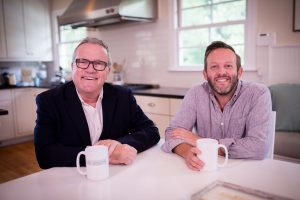
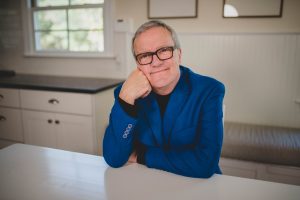
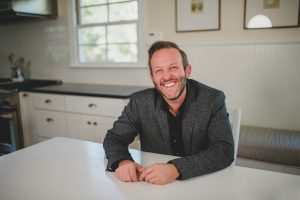
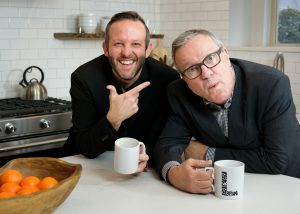

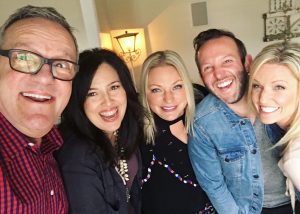
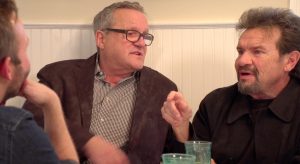
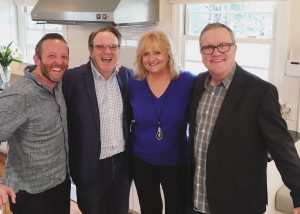

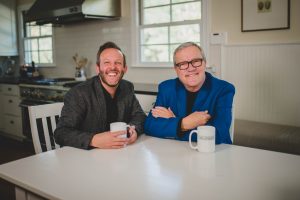
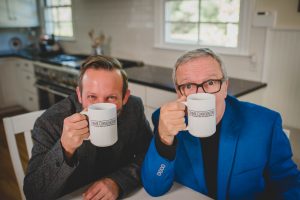
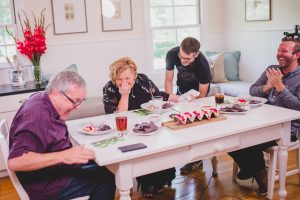

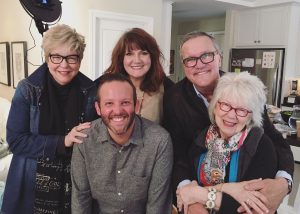


WOW! So much insight ! Thank you for sharing. Lessons learned.
Hi Mark and Andrew!
I appreciate learning from your insights, about how God has brought you through.
My wife and I are retired missionaries from having served in Thailand (27 years) and Cambodia 25). Our pioneer church planting work was among local farmers, starting 50 years ago. In those early days we saw people come off drugs. The bandit and murderer came to Christ and soon our ne3 Christians were fully mobilised while preaching Christ within their local culture–and that work even though we now live at a seniors residence in Calgary, Alberta, Canada Jim and Agnes